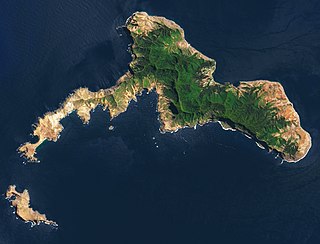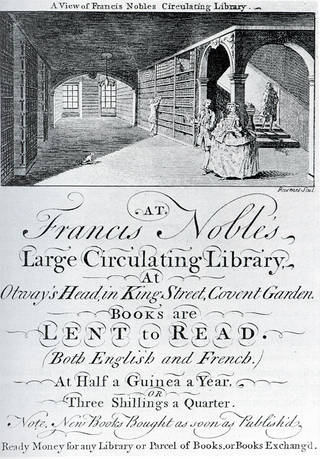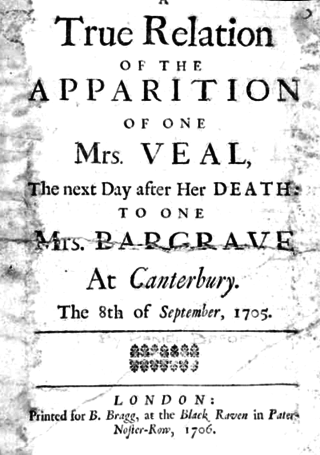Related Research Articles

Alexander Selkirk was a Scottish privateer and Royal Navy officer who spent four years and four months as a castaway (1704–1709) after being marooned by his captain, initially at his request, on an uninhabited island in the South Pacific Ocean. He survived that ordeal, but died from tropical illness years later while serving as a lieutenant aboard HMS Weymouth off West Africa.

Daniel Defoe was an English novelist, journalist, merchant, pamphleteer and spy. He is most famous for his novel Robinson Crusoe, published in 1719, which is claimed to be second only to the Bible in its number of translations. He has been seen as one of the earliest proponents of the English novel, and helped to popularise the form in Britain with others such as Aphra Behn and Samuel Richardson. Defoe wrote many political tracts, was often in trouble with the authorities, and spent a period in prison. Intellectuals and political leaders paid attention to his fresh ideas and sometimes consulted him.

Robinson Crusoe is an English adventure novel by Daniel Defoe, first published on 25 April 1719. Written with a combination of Epistolary, confessional, and didactic forms, the book follows the title character after he is cast away and spends 28 years on a remote tropical desert island near the coasts of Venezuela and Trinidad, encountering cannibals, captives, and mutineers before being rescued. The story has been thought to be based on the life of Alexander Selkirk, a Scottish castaway who lived for four years on a Pacific island called "Más a Tierra" which was renamed Robinson Crusoe Island in 1966. Pedro Serrano is another real-life castaway whose story might have inspired the novel.

The Farther Adventures of Robinson Crusoe is a novel by Daniel Defoe, first published in 1719. Just as in its significantly more popular predecessor, Robinson Crusoe (1719), the first edition credits the work's fictional protagonist Robinson Crusoe as its author. It was published under the considerably longer original title: The Farther Adventures of Robinson Crusoe; Being the Second and Last Part of His Life, And of the Strange Surprising Accounts of his Travels Round three Parts of the Globe. Although intended to be the last Crusoe tale, the novel is followed by a non-fiction book involving Crusoe by Defoe entitled Serious Reflections During the Life and Surprising Adventures of Robinson Crusoe: With his Vision of the Angelick World (1720).
This article contains information about the literary events and publications of 1719.
This article is a summary of the major literary events and publications of 1720.

Friday is one of the main characters of Daniel Defoe's 1719 novel Robinson Crusoe and its sequel The Farther Adventures of Robinson Crusoe. Robinson Crusoe names the man Friday, with whom he cannot at first communicate, because they first meet on that day. The character is the source of the expression "Man Friday", used to describe a male personal assistant or servant, especially one who is particularly competent or loyal.
Charles Gildon, was an English hack writer and translator. He produced biographies, essays, plays, poetry, fictional letters, fables, short stories, and criticism. He is remembered best as a target of Alexander Pope in Pope's Dunciad and his Epistle to Dr. Arbuthnot and as an enemy of Jonathan Swift. Due to Pope's caricature of Gildon as well as the volume and rapidity of his writings, Gildon has become the epitome of the hired pen and literary opportunist.

Robinson Crusoe Island is the second largest of the Juan Fernández Islands, situated 670 km west of San Antonio, Chile, in the South Pacific Ocean. It is the more populous of the inhabited islands in the archipelago, with most of that in the town of San Juan Bautista at Cumberland Bay on the island's north coast. The island was formerly known as Más a Tierra.

Robinson Crusoe on Mars is a 1964 American science fiction film directed by Byron Haskin and produced by Aubrey Schenck that stars Paul Mantee, Victor Lundin, and Adam West. It is a science fiction retelling of the classic 1719 novel Robinson Crusoe by Daniel Defoe. The film was distributed by Paramount Pictures and filmed in Technicolor and Techniscope.

Robinsonade is a literary genre of fiction wherein the protagonist is suddenly separated from civilization, usually by being shipwrecked or marooned on a secluded and uninhabited island, and must improvise the means of their survival from the limited resources at hand. The genre takes its name from the 1719 novel Robinson Crusoe by Daniel Defoe. The success of this novel spawned so many imitations that its name was used to define a genre, which is sometimes described simply as a "desert island story" or a "castaway narrative".

Augustan prose is somewhat ill-defined, as the definition of "Augustan" relies primarily upon changes in taste in poetry. However, the general time represented by Augustan literature saw a rise in prose writing as high literature. The essay, satire, and dialogue thrived in the age, and the English novel was truly begun as a serious art form. At the outset of the Augustan age, essays were still primarily imitative, novels were few and still dominated by the Romance, and prose was a rarely used format for satire, but, by the end of the period, the English essay was a fully formed periodical feature, novels surpassed drama as entertainment and as an outlet for serious authors, and prose was serving every conceivable function in public discourse. It is the age that most provides the transition from a court-centered and poetic literature to a more democratic, decentralized literary world of prose.
In Protestant Christianity, the relationship between Law and Gospel—God's Law and the Gospel of Jesus Christ—is a major topic in Lutheran and Reformed theology. In these religious traditions, the distinction between the doctrines of Law, which demands obedience to God's ethical will, and Gospel, which promises the forgiveness of sins in light of the person and work of Jesus Christ, is critical. Ministers use it as a hermeneutical principle of biblical interpretation and as a guiding principle in homiletics and pastoral care. It involves the supersession of the Old Covenant by the New Covenant and Christian theology.
Will was a Miskito pirate from the Misquito Coast, then part of the Spanish Main. He was left behind on the uninhabited Robinson Crusoe Island, surviving there alone for more than three years. It is possible that Will became the inspiration for Man Friday, the cannibal character in Daniel Defoe's novel Robinson Crusoe.

The Adventures of Robinson Crusoe is a 1922 American adventure film serial directed by Robert F. Hill and based upon the 1719 novel by Daniel Defoe. It is now considered to be a lost film.
Adventures of Robinson Crusoe, a Sailor from York is a 1982 Czechoslovak stop motion-animated film, with animated flashbacks, directed by Stanislav Látal. The film is based on the 1719 novel Robinson Crusoe by Daniel Defoe.

The Apparition of Mrs. Veal is a pamphlet that was published anonymously in 1706 and is usually attributed to Daniel Defoe. Titled in full A True Relation of the Apparition of one Mrs. Veal, the next Day after her Death: to one Mrs. Bargrave at Canterbury. The 8th of September, 1705, it has been described as "the first modern ghost story".
Andrew Moreton is a pseudonym used by Daniel Defoe in several pamphlets published between 1725 and 1729, proposing some new reflections on themes already discussed in Defoe's 1697 An essay upon projects. Moreton is presented as a crotchety middle-class old gentleman complaining about the indecency of London social life in the latest years. Fulfilling his duty as an honest and concerned citizen, Moreton firmly advances possible reforms in order to improve the quality of life of all social classes.

The 2003 Nobel Prize in Literature was awarded to the South African novelist John Maxwell Coetzee, better known simply as J. M. Coetzee, "who in innumerable guises portrays the surprising involvement of the outsider." He is the fourth African writer to be so honoured and the second South African after Nadine Gordimer in 1991.
References
- ↑ Daniel Defoe (1720). "Serious Reflections During the Life and Surprising Adventures of Robinson Crusoe: With his Vision of the Angelick World" (PDF). Rci.rutgers.edu. Retrieved 27 October 2018.
- ↑ Novak, Maximillian (Fall 2013). "Imaginary Voyages in Serious Reflections and A Vision of the Angelick World" (PDF). Digital Defoe: Studies in Defoe & His Contemporaries. 5 (1): 34–44. ISSN 1948-1802.
